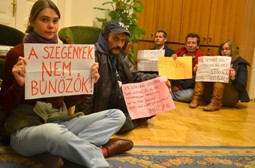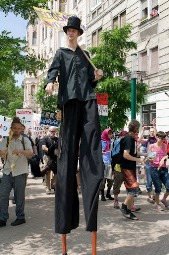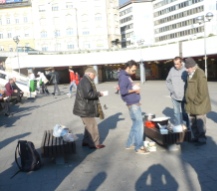 We are very happy to announce that the Hungarian Constitutional Court, the country’s highest court, has confirmed what The City is for All has represented for years: „The mere fact that someone lives in public space does not infringe on other people’s rights, does not cause damage and does not endanger the habitual use of space or public order” – as a result, punishing street homelessness is unconstitutional. The decision of the Constitutional Court is a victory for the rule of law, for homeless people and for everyone who has spoken out against the public persecution of homeless people over the years.
We are very happy to announce that the Hungarian Constitutional Court, the country’s highest court, has confirmed what The City is for All has represented for years: „The mere fact that someone lives in public space does not infringe on other people’s rights, does not cause damage and does not endanger the habitual use of space or public order” – as a result, punishing street homelessness is unconstitutional. The decision of the Constitutional Court is a victory for the rule of law, for homeless people and for everyone who has spoken out against the public persecution of homeless people over the years.
The rule of law has prevailed! The Hungarian Constitutional Court struck down on the criminalization of homelessness
The growing criminalization of homelessness in Hungary

The socio-spatial exclusion of street homeless people is a powerful trend in many cities all over the world. While according to Doherty et al. (2008), these processes are less pervasive in Europe than in the US, a number of post-socialist countries stand out with a revival of anti-homeless policies. Hungary, in particular, has recently experienced a surge in exclusionary practices and policies both locally and nationally. From a broader perspective, since Hungary’s transition from state socialism to neoliberal capitalism in the 1980s, there has been a general tendency towards institutionalizing the exclusion and criminalization of poor and marginalized groups. In the following, we will first look at the history of homelessness in Hungary over the past decades, then we will give an overview of the responses the state has offered as well as the reasons for the growing criminalization of homelessness.
2012.10.31. 15:00 • Szólj hozzá! Címkék: média english életvitelszerű lakhatás közterületen criminalizationSecond Vacant Buildings March in Budapest - video
Interjú Mo George New York-i aktivistával
2012. július 17-én tapasztalatcserét tartottunk észak-amerikai közösségszervezőkkel, ahol többek között az érdekérvényesítés eszközeiről, a toborzás módszereiről és az érintettek aktivizálásáról beszélgettünk. Mércse Pali, a kőbányai erdő lakója és az AVM újdonsült tagja interjút készített Mo George-dzsal, aki a nagy múlti New York-i civil szervezet, a Community Voices Heard (CVH) egyik vezető aktivistája.
--------------
Ha tetszett ez a bejegyzés, like-old te is a Facebook-oldalunkat!
AVM's recommendations for the utilization of empty buildings and apartments
 There is a housing crisis in Hungary today. Thousands of people live on the streets and in shelters, hundreds of thousands are terrified of the prospect of eviction or having to look for shelter in crowded, unhealthy apartments because they do not have any alternatives to the market price apartments and mortgages. The ratio of public housing is one of the lowest in the European Union (3%), and the number of empty, unused private and municipally owned apartments is increasing.
There is a housing crisis in Hungary today. Thousands of people live on the streets and in shelters, hundreds of thousands are terrified of the prospect of eviction or having to look for shelter in crowded, unhealthy apartments because they do not have any alternatives to the market price apartments and mortgages. The ratio of public housing is one of the lowest in the European Union (3%), and the number of empty, unused private and municipally owned apartments is increasing.
The Város Mindenkié (The City is for All) demands the development of a comprehensive housing policy from each and every local and the national government which would provide protection against massive unemployment and enables low income households to access to affordable housing via the expansion of social housing. One of the first steps would be the utilization of the unused, vacant buildings and apartments of the local governments and the inciting of establishing social tenancies in vacant, privately owned properties.
The AVM’s recommendations for the utilization of vacant apartments:
The registration of the vacant real estates and the publication of the statistical data.
The goal of the register is to gain information on the real estates which have been abandoned for a longer period of time (sometimes, even for years) for the local governments and the civil organizations in order to make these homes available for the programs concerning the utilization of empty apartments.
Granting temporary tenancies of the apartments, which are waiting for renovation or demolition, in public housing programs.
Instead of leaving certain apartments empty for years by citing plans for future demolitions, so called temporary tenancies should be established with indigent tenants. The contract could be for a single year (with options for renewal) for extremely benevolent rentrates or merely for the overhead charges. While this wouldn’t be a permanent solution of the tenants, it would win the them enough time to accumulate some saving or to look for other solutions. The bottom line is, do not evict the tenants until right the actual works begin to be conducted.
Surveying the requirements of turning non-inhabitable buildings into habitable residences.
Local governments should conduct a survey on the possibilities of turning state-owned, uninhabitable buildings into residences. Those which are not upgradeable are to be made available to civil organisations and small businesses which could energize the city.
2012.06.19. 06:00 • Szólj hozzá! Címkék: english megoldás lakhatás üres házakThe City is for All: We are not afraid of breaking laws for justice
 „As a Hungarian citizen, and as a homeless person,
„As a Hungarian citizen, and as a homeless person,
I wanted to take a stand against these laws which punish people for being poor and without a proper home.
- Ferenc Sziráki, a homeless participant of the sit-in
The first court ruling about the sit-in that took place in October 2011 against the criminalization of homelessness – in which several members of The City is for All (AVM) took part – was announced today. According to the judge, the activists protesting criminalization are guilty of misdemeanor. The members of AVM our proud of what they did: if we need to, we will engage in civil disobedience again, and we encourage other groups of the democratic opposition to do the same.
The City is for All has been fighting against the exclusion and police harassment of homeless people since its founding. Our first protest in 2009 was directed against the ex-mayor of Budapest’s 11th district (a member of the “socialist” party), who announced the establishment of “homeless-free zones”. Since then, the penalization of homelessness became official government policy. The ruling neo-conservative party, Fidesz, considers homeless people second-class citizens and criminals. First the city assembly of Budapest passed an ordinance that made it a misdemeanor to sleep in public spaces. This was followed by a law passed by the Parliament, which made sleeping rough punishable with jail.
Several members of our group took part in the sit-in in the office of Máté Kocsis, who was one of the sponsors of the law about the imprisonment of those sleeping rough, and who has been at the forefront of the current anti-homeless campaign. We sat there, altogether around 30 people, silently, and we let the police know that we would not leave until they revoke the cruel and unconstitutional law. The law was not revoked, instead Máté Kocsis called the police who arrested and fined us. Legal defense for the activists was provided by dr. Tamás Fazekas of the Hungarian Civil Liberties Union. Today’s court ruling found Ferenc Sziráki, a homeless member of AVM, and one of the participants in the sit-in, guilty of “disobedience to lawful action by the authorities”, and – in consideration of his “impeccable record” – gave him a warning.
Visszatekintés: ülősztrájk a hajléktalanság kriminalizációja ellen (2011 november)
Food is a right and not a privilege!
 The activists of the Food Not Bombs movement in the United States initiated a campaign starting from April1, 2012. They are protesting against state legislation which made it impossible for people in need, especially for the homeless to receive food donations on the streets. They claim that food is a right and not a privilege and the Hungarian City is For All shares this opinion. It means that everyone has the right to receive proper and decent food as well as to give it away for those who need it.
The activists of the Food Not Bombs movement in the United States initiated a campaign starting from April1, 2012. They are protesting against state legislation which made it impossible for people in need, especially for the homeless to receive food donations on the streets. They claim that food is a right and not a privilege and the Hungarian City is For All shares this opinion. It means that everyone has the right to receive proper and decent food as well as to give it away for those who need it.


.jpg)